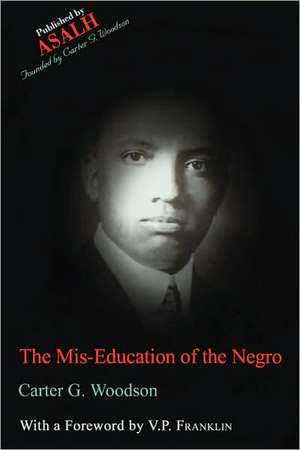The Mis-Education of the Negro
Autor Carter G. Woodsonen Limba Engleză Paperback – 31 iul 2005
| Toate formatele și edițiile | Preț | Express |
|---|---|---|
| Paperback (7) | 55.88 lei 3-5 săpt. | |
| Dover Publications – 31 aug 2005 | 55.88 lei 3-5 săpt. | |
| Assoc for the Study of African American Life – 31 iul 2005 | 60.24 lei 3-5 săpt. | |
| Eworld – 30 iun 2012 | 61.66 lei 3-5 săpt. | |
| African American Images – sep 2000 | 82.46 lei 3-5 săpt. | +15.36 lei 6-12 zile |
| Book Tree – 30 noi 2007 | 98.95 lei 3-5 săpt. | |
| Mint Editions – 17 ian 2023 | 103.48 lei 3-5 săpt. | |
| Digireads.com – | 58.85 lei 6-8 săpt. | |
| Hardback (1) | 158.14 lei 3-5 săpt. | |
| Mint Editions – 17 ian 2023 | 158.14 lei 3-5 săpt. |
Preț: 60.24 lei
Nou
Puncte Express: 90
Preț estimativ în valută:
11.53€ • 12.06$ • 9.58£
11.53€ • 12.06$ • 9.58£
Carte disponibilă
Livrare economică 13-27 martie
Preluare comenzi: 021 569.72.76
Specificații
ISBN-13: 9780976811107
ISBN-10: 0976811103
Pagini: 123
Dimensiuni: 152 x 229 x 8 mm
Greutate: 0.21 kg
Ediția:Lte and Texas A.
Editura: Assoc for the Study of African American Life
Locul publicării:United States
ISBN-10: 0976811103
Pagini: 123
Dimensiuni: 152 x 229 x 8 mm
Greutate: 0.21 kg
Ediția:Lte and Texas A.
Editura: Assoc for the Study of African American Life
Locul publicării:United States
Descriere
Woodson's classic work of criticism explores how the education received by blacks has failed to give them an appreciation of themselves as a race and their contributions to history. Woodson puts forward a program that calls for the educated to learn about their past and serve the black community. (Education/Teaching)
Cuprins
Foreword
Preface
I. The Seat of the Trouble
II. How We Missed the Mark
III. How We Drifted Away from the Truth
IV. Education Under Outside Control
V. The Failure to Learn to Make a Living
VI. The Educated Negro Leaves the Masses
VII. Dissension and Weakness
VIII. Professional Educated Discouraged
IX. Political Education Neglected
X. The Loss of Vision
XI. The Need for Service Rather Than Leadership
XII. Hirelings in the Places of Public Servants
XIII. Understand the Negro
XIV. The New Program
XV. Vocational Guidance
XVI. The New Type of Professional Man Required
XVII. Higher Strivings in the Service of the Country
XVIII. The Study of the Negro
Appendix
Index
Notă biografică
Dr. Carter G. Woodson (1875 - 1950) was an author, historian, scholar, and founder of the Association for the Study of African American Life and History. Born to an extremely poor family of formerly enslaved Africans, Woodson grew up on a farm in New Canton, Virginia. Largely self-taught due to a lack of consistent access to school, Woodson was nevertheless able to master most academic subjects and carry with him the pride of being born free. He left home with his older brother at the age of seventeen in hopes of pursuing secondary education at the Douglass High School and despite many hardships, worked tirelessly until he was able to achieve that goal and receive his diploma. Over the next twenty years, he would begin his academic career and embark on an educational journey from the University of Chicago to Harvard, becoming the second African-American to earn a doctorate and the only African-American to be born of enslaved parents and receive a doctorate in History. Despite his many academic achievements, Woodson was shut out of employment opportunities in higher education due to racism and¿growing increasingly frustrated¿he set out to create an institution that would make it possible for Black scholars to study the history of their people. With the aid of Willian D. Hartgrove, George Cleveland Hall, Alexander L. Jackson, and James E. Stamps, Woodson founded the Association for the Study of Negro Life and History in 1915. The very next year, the Association would begin publishing The Journal of African American History which would be released quarterly without fail even in the face of massive economic downturn and world war. Woodson also worked tirelessly to produce his own books on African-American History over the next thirty years including but not limited to: A Century of Negro Migration (1918), The Education of the Negro Prior to 1861 (1919), The History of the Negro Church (1921) the first survey of free Black slaveowners in the United States, Free Negro Owners of Slaves in the United States in 1830 (1924) and his magnum opus, The Miseducation of the Negro (1933). During this period of continious academic output, Woodson also called for the celebration of ¿Negro History Week.¿ First observed in 1926, Woodson sought to emphasize ¿the Negro in history,¿ with parades, speeches, poetry readings, and lectures. Woodson¿s efforts¿both academic and policital¿also placed him at the center of Black intellectual life throughout the late 1920s and early 1940s, he even wrote for Marcus Garvey¿s newspaper The Negro World until knowledge of Garvey¿s meetings with the Klu Klux Klan became public. Having completely dedicated his life to the research, Woodson lived out the rest of his days devoted to the preservation of African-American history. While he would meet his ultimate end in 1950, Dr. Carter G. Woodson¿s life and work continue to live on in America today.
